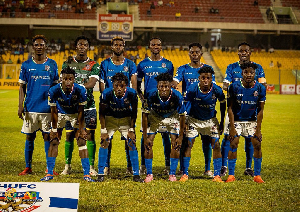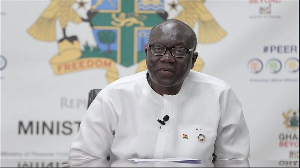A six-member team from the head office of the National Health Insurance Authority is in the Upper West region to engage with various stakeholders of the NHIS in the region on how to improve service delivery under the Scheme.
The team met with its staff across the region on Monday and continued with its sensitization efforts ahead of the roll-out of capitation in the region. The NHIA is implementing the capitation payment system across the country following a pilot in Ashanti region.
The system, which pays service providers a pre-determined rate for a pre-determined set of conditions or services over a defined time period, seeks to improve efficiency in the administration of the Scheme and improve the quality of care. The team called on the Upper West Deputy Regional Minister, Hon. Abu Kansangnabata to brief him on efforts being made by the Scheme to improve access to healthcare in the Upper West region.
Leader of the team, Nathaniel Otoo [Deputy Chief Executive, Operations, NHIA] told the deputy minister the visit was part of the NHIA’s “practice of working with the various decentralized structures” of the state in making certain that the implementation of the NHIS runs smoothly.
According to him, the visit was to afford the NHIA the opportunity to brief the minister on the implementation of the Scheme in the region. Mr Otoo revealed that the Upper West is the region with the highest subscription of its population onto the Scheme, and further praised the cordial relationship between health service providers and the NHIA in the region.
The Deputy Chief Executive mentioned that the trip was also to engage stakeholders towards the roll-out of capitation nation-wide.
Hon. Kansangnabata who stood in for the regional minister, lauded the NHIA on strides it was making in providing financial access to healthcare in the region and pledged the Regional Coordinating Council’s support to ensure that the NHIS succeeds with its plans in the region. The deputy Minister further stated that his outfit will provide the necessary logistics as they are able to, as their contribution to guarantee the success of the program.
He also asked the NHIA to “intensify its monitoring and supervisory activities as that will produce feedback necessary to enhance the program".
Hon. Kansangnabata encouraged the Authority to continue with stakeholder engagements on a more regular basis and especially at the community level.
Project Director of the Nation-wide Capitation Roll-out Program, Anthony Gingong, said, “we all have a responsibility to ensure that the NHIS program we are running is sustainable.” According to him, in introducing the NHIS, a number of provider reimbursement methods were prescribed including capitation; therefore, the implementation of the system was backed by law.
Mr. Gingong pointed out that capitation promotes quality of care and ensures that subscribers are bonded to their healthcare providers.
“From here, we are moving to the Upper East and Volta regions as the next phase of the nation-wide implementation takes off. We have already done what we call health facility mapping and at the end of the day, quality of care is what we are all looking for,” Mr Gingong said.
He concluded that the Authority learnt many lessons from the Ashanti pilot that have informed the next phase of the nation-wide implementation.
The team as part of the 3-day trip met with district office staff of the NHIA, service providers and other stakeholders in the region.
The six-member team from the Authority was made up of Nathaniel Otoo, Deputy Chief Executive, Operations, NHIA, Anthony Gingong, Project Director of the Nation-wide Capitation Roll-out Program, Ben Kusi, Director, Membership, Provider Relations and Regional Operations, OB Acheampong, Director, Research and Development, Eric Ametor-Quarmyne, Consultant and Selorm Adonoo, Communications Manager.
Health News of Tuesday, 18 February 2014
Source: NHIA












